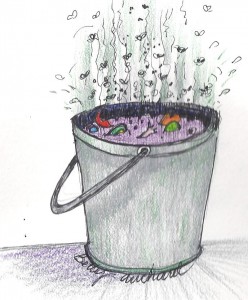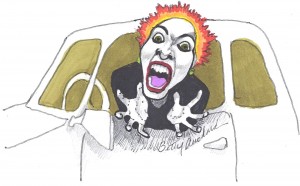On the Fourth of July, 1935, I was so excited I felt nutty. The whole Peal family was having a picnic and Uncle Cullen had made my favorite drink: root beer. He said, “Betty Boop, you can have all you want ‘cuz it’s free.” Back then, I thought root beer was real beer made for little kids. I could see why grownups liked real beer because I couldn’t get enough of kid’s beer. When I took my first big swallow, I thought maybe he’d used the wrong recipe because it wasn’t what I was expecting. It wasn’t fizzy and it wasn’t cold. My disappointment was hard to hide, but Uncle Cullen didn’t seem to notice. He said, “D’ya like it?”
“Uh HUH,” I lied. But warm root beer without bubbles was just poor people’s version of root beer.
The same year, Mama’s father, Grandpa Eastburn, served his homemade beer for grownups at a weenie roast in his back yard. Everyone in my family guzzled it out of cold tin cans that were kept in a tub of ice. When the party was over, my two-year-old brother, Bobby, went around to all the empty cans and tipped them bottoms up to his mouth in case something was left behind. It was a harmless activity so I didn’t stop him. When he tripped over his own feet and said, “ooops” in a very silly manner, I wondered if he had gotten drunk on all of those little drops of homemade booze that grownups left behind.
When Bobby had trouble standing up, I got scared . I hustled to my parents and whispered, “Mama — Dad…I think Bobby is drunk!” They jumped up as fast as they did the time I said, “Mama, I think Bobby fell out the window.” Both times I was supposed to be watching him and I forgot.
While my parents were studying Bobby, he plopped himself down on the picnic blanket and giggled so hard that he ran out of breath. Mama looked at Dad with questioning eyes and Dad said, “Yep, he’s tipsy all right.” They wasted no time driving to the hospital. I don’t know what they did there, but Bobby got sobered up and came home a little sleepy. I promised to watch him more carefully from then on.
A few years later my dad made wine for the first and only time in his life. It was fun watching him put all kinds of stuff in a bucket down in the basement. He threw in fruit, peelings, juice and rinds then warned my brother, sister, and me saying, “Doncha be messin’ around with this, ‘ya hear?”
Because I was told not to mess around with the mysterious bucket, I really had to. Dad had placed a piece of plywood on top and weighted it with a brick as a warning. It discouraged my brother and sister but not me. I took a chance and removed the board and brick and sniffed the liquid several times. It smelled like the ground under the apple tree when the apples had turned to brown mush.
A few days later, when no one was around, I removed the brick and board again to get a closer look at the stuff in the pail. By then it was putrid and alive with bubbles. Thick foam was forming over the surface and pieces of what looked like garbage floated wherever there was no foam. Gnats hovered over the mess like they were having a reunion at their favorite bar.
My finger wanted to touch the mixture so I let it move into the bucket so it could tell me what it was like. It was soft and puffy, like stiff froth on root beer. My finger went through scum into the juice below while tiny bugs tickled my hand. It was creepy. When I pulled my finger out, it smelled like spoiled fruit. I couldn’t imagine any miracle that might turn that icky mess into real wine unless Jesus showed up like he did in the Bible. But since Dad never went to church with us, I doubted that Jesus would help him make wine. I decided to ask my father about the ingredients in the pail.
I said, “Dad, I think your wine in the basement has gone bad.”
“WHAT? WHY?”
“Because mold and flies are all over the top of it.”
“I told you kids not to mess around that bucket.”
“I’m sorry.”
“You didn’t touch it, did you?”
“Oh no.”
“Good thing.”
Then I got worried. “Dad, what would happen if I did touch it?”
He said, “The mixture in the bucket sets around for awhile and eventually creates good bacteria that turns the juice into wine.” I didn’t understand that part about bacteria, but he kept talking. “Sticking your finger in it will add bad bacteria that will cause the juice to go over.”
“To go ‘over’ like when milk sours?”
“Yeah…somethin’ like that.”
It sounded like I might have messed up Dad’s wine. It scared me even more when he added, “If the wine goes over, it won’t be fit for human consumption.”
I felt guilty telling Dad that I did not touch the stinky juice, but since I didn’t really understand the importance of good and bad bacteria, I put my guilt behind me. Several weeks later, the concoction must have turned into wine because Dad said it was ready for drinking. He called Uncle Cullen and Aunt Irma so they could get in on the fun. Mama helped to strain the liquid through cheesecloth several times until everything chunky was gone. By that time, the amount left was half a bucket of brownish-colored liquid.
Dad and Uncle Cullen were excited. My uncle said, “Big brother, it looks like wine; it smells like wine. Let’s see if it TASTES like wine.” Then Dad, Mom, Uncle Cullen, and Aunt Irma sat around our kitchen table playing Pinochle, laughing, talking, joking, and having a high old time ‘til the homemade wine was gone.
It was probably that bad bacteria on my finger when I poked it through the moldy surface. But since they were all still alive, I didn’t feel a need to confess.
* * *
story and illustrations by Betty Auchard
Accompanied by my brother, Bob Peal, in August 2007, I made a pilgrimage to our hometown of Cedar Rapids, Iowa, while doing research for my second memoir, The Home for the Friendless. Things had been going very well, and everyone we met that week was courteous and helpful in our quest for information and records regarding our wacky childhood.
On the last day of the trip, we went to L Avenue which turned out to be another wonderful “find” since we discovered three important locations there: the one-room house with no plumbing where five of us had lived; the inviting corner store that housed Hassan Murray’s Market where we could charge our groceries, and the tiny little house we rented when Bob was born in 1933. That mini house is located on L Avenue, about three houses from a dead end. (Going the opposite way, L Avenue crosses the RR tracks where we lived in another hovel when Bob was one-year-year old. We moved a lot.)
The “dollhouse” where Bob was born ends in a very tight, crowded cul-de-sac. Tiny houses line the end curve and are set close together on both sides of the street. When we realized it did not go through, we also found that it was very hard to turn the car around on that narrow road. Since no cars were in site except those parked against the curb, I said “Bob, just park across this other driveway and let me pop out to take a couple of photos while you turn the car around. I’m sure whoever lives here will understand if we tell them you were born here 74 years ago.” And I jumped out with my camera and moved farther away so I could get the entire little dwelling in my viewfinder.
Suddenly, a car came zipping up that short street right against Bob’s hood so he couldn’t budge another inch. A mean-looking wretch-of-woman rolled down her window and screamed at me, “DON’T EVER BLOCK SOMEONE’S DRIVEWAY!”
I said, “I’m sorry. We’re from out-of-state and used to live in one of these houses when we were little, and we’re taking a picture. My brother is trying to turn the car around.”
She didn’t care what I said. She begrudgingly backed up and turned into another driveway so Bob could maneuver his way out of a tight spot. When he was halfway past the driveway where she had temporarily parked, she started to back down toward Bob’s car while he was still creeping to avoid other parked cars. Then she screamed again at the air, “GET THE F*** OUTTA MY WAY!”
By that time Bob was out of her range and he drove way down the street and parked in an open slot. She was now very close to where I was standing to get my picture. She struggled to turn her wheel so she could go up her own driveway two houses away from the one we were photographing. She yelled at me again.
“YOU TWO ARE SURE THE SURPRISE IN A HAPPY MEAL!”
Was that a regional insult or what?
I snapped off a couple of fast pictures and marched down the hill to my brother’s car. I was actually a bit shaky, but Bob never heard what she was saying. He only knew she had been screaming at us and said, “What the hell was that all about?” When I repeated her insults, he was dumbfounded. It was hard to get this awful woman off of my mind.
But, eventually both of us started using her sentences and laughing ourselves silly. If someone was driving too slowly in front of us, I said so no one outside could hear, “Get the f*** outta my way.” In the hotel room in Omaha if I set my suitcase too far out into the room my brother yelled, “Don’t ever block someone’s path.” If he was being silly and said something stupid on purpose I said, “You sure are the surprise in a Happy Meal.”
That one still cracks me up. Whatever in the world does it imply?
Eventually, we got over her rudeness and invented scenes that we thought might work like knocking on her door and confessing that we were from Time Magazine doing a survey on the friendliness of small town people. We were going to ask to take her picture and send her a copy of that issue so we also needed the correct spelling of her name (we already knew her address), but we wanted to thank her for helping us get a real good story. In other words, we got a lot of mileage out of that woman’s nasty, inhospitable performance. I think she either had serious behavioral issues or had just come from church.
* * *
story and illustration by Betty Auchard














